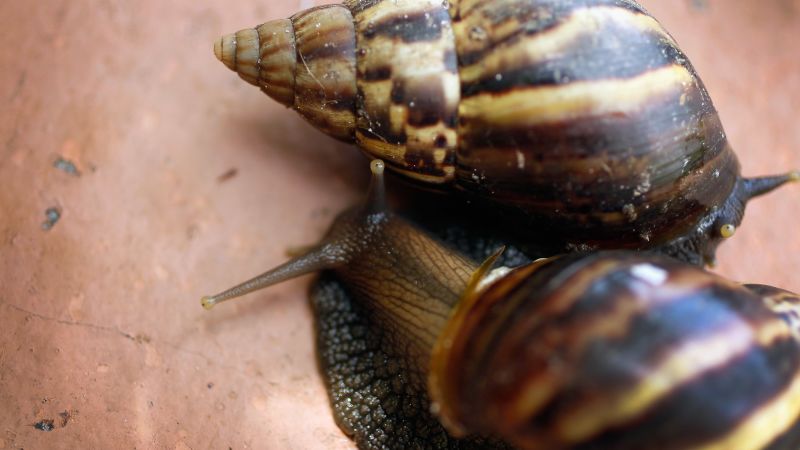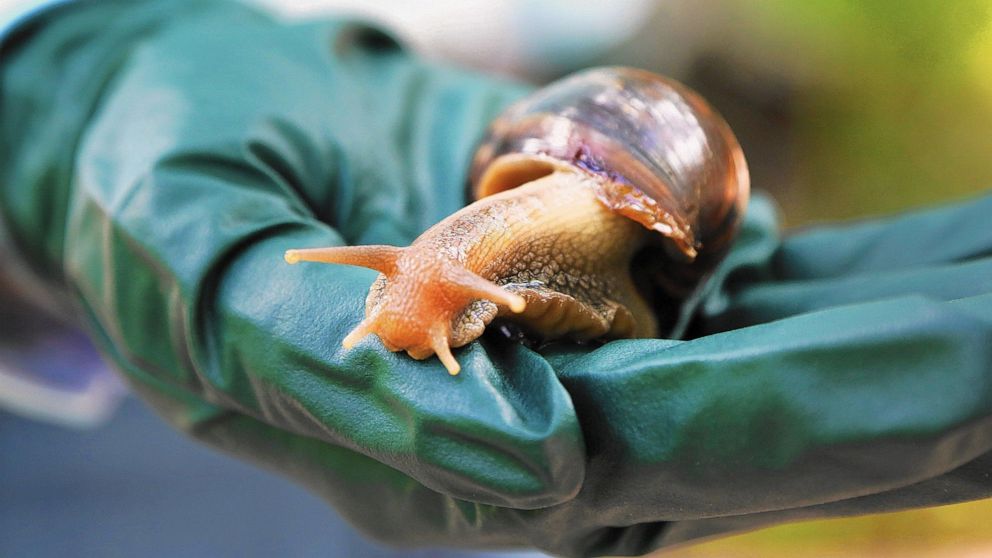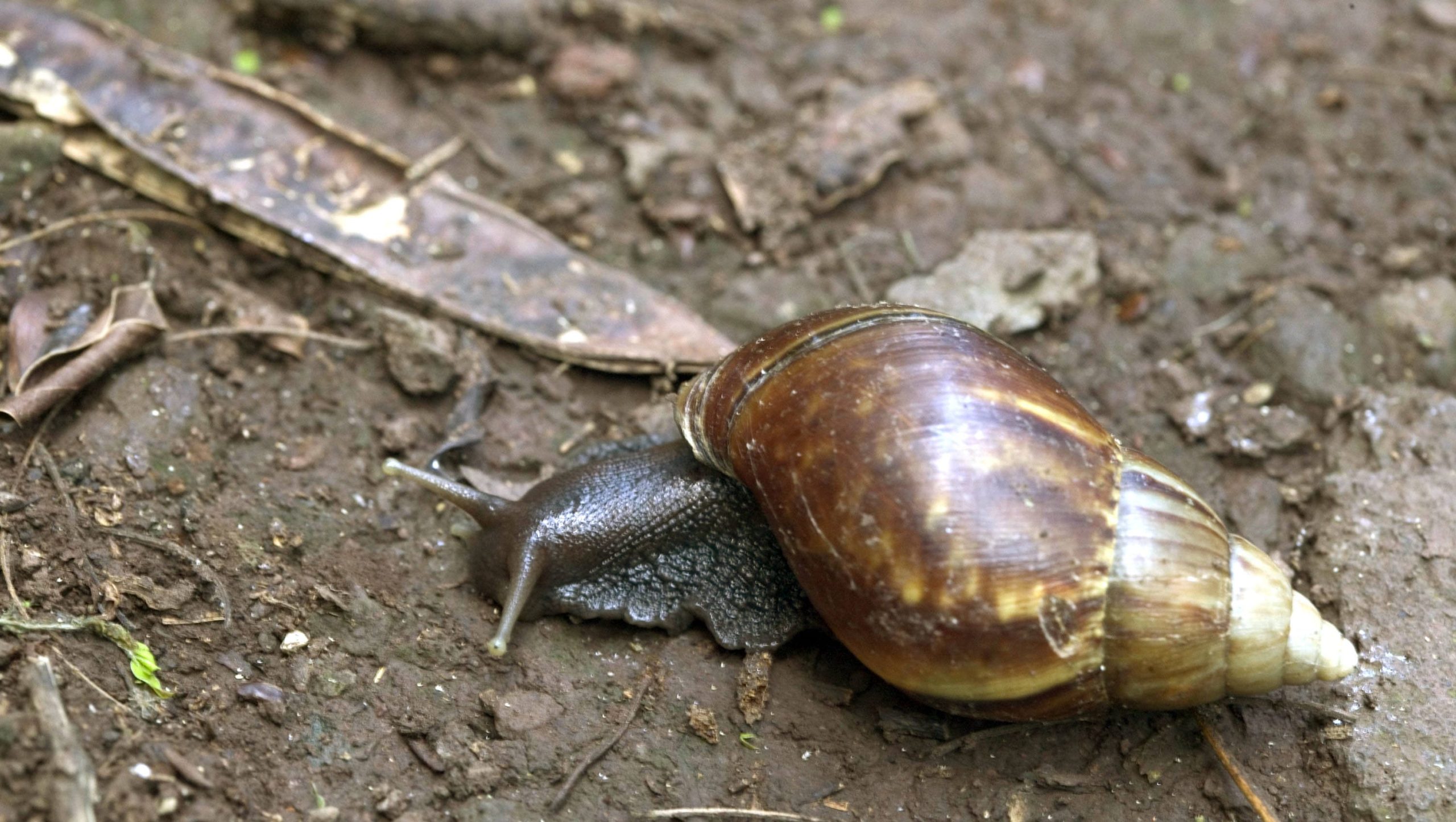Giant African Land Snails: A Threat to Agriculture and Natural Environments
Giant African land snails are one of the most dangerous snail species that can cause huge damage to agriculture and natural environments. These snails are known for their rapid reproduction and their capability of reproducing several times without mating again. They can generate clutches of eggs every 2 to 3 months, producing around 1,200 eggs within a single year. These snails can be found in tropical and subtropical environments, but they can survive in cold conditions as well. Moreover, they are a significant health risk to humans as they carry a parasitic nematode known as rat lungworm, which can cause meningitis. This article outlines the impact of giant African land snails on the environment and aims to provide information on how to prevent their spread.
Damaging Snails

Threats to Florida Agriculture
The Giant African Snail (GAS), which was introduced in the 1960s to southern Florida, caused a massive economic threat to agriculture and natural areas. The snail consumes at least 500 types of plants, including peanuts, beans, peas, cucumbers, and melons. Moreover, the snail can cause massive structural damage to plaster and stucco structures, including roads, buildings, and homes. The Calcium shells of these snails are also sharp enough to break the tires of vehicles that run over them.
Health Hazards to Humans
The threat of giant African land snails to human health is not less dangerous. The snails carry a parasitic nematode known as rat lungworm, which can cause meningitis in humans. If ingested by humans, the nematode can lead to swelling of the membranes surrounding the brain and spinal cord.
Snails in Florida

Eradicating Giant African Snails
The giant African land snails have been eradicated twice in Florida; first in 1975, and most recently in 2021 from a detection in 2011 in Miami-Dade County. However, the giant African land snails are still a threat to Florida, as they were recently detected in Broward County and Miramar area, Florida. State officials are responding to a new introduction of the invasive snails and have established two treatment areas in the quarantine zone. The state government plans to use the metaldehyde-based molluscicide method, which is approved for residential use to eradicate these snails.
The Illegal Import and Possession of Giant African Land Snails
The giant African land snails are illegal to import or possess in the United States without a permit. These snails are often illegally imported by individuals for exhibitions, as pets, or for food.
Preventing the Spread of Giant African Land Snails

Recognizing Giant African Land Snails
Recognizing giant African snails is essential to prevent their spread. These snails vary in phenotype and can possess either light to dark brown shells with milky white flesh or Dark brown shells with grayish-brown flesh. Populations vary in other areas as well, so it’s essential to look at the ID sheet or email a photo for identification to [email protected]. If you see a suspect snail, don’t handle it without wearing gloves.
Preventing the Spread through Gardening and Landscaping
It is essential to be careful when gardening and landscaping to prevent the spread of giant African land snails. Always wash your hands after handling snails or slugs. When traveling in areas where the parasite is common, avoid eating uncooked vegetables. Moreover, avoid moving plants, plant parts, soil, yard waste, debris, compost, or building materials from the quarantine area.
Cooperate with All Quarantine Restrictions or Rules that might be imposed.
It is the responsibility of every citizen to cooperate with all quarantine restrictions or rules that might be imposed. It is also essential to know the quarantines in our area and learn to leave hungry pests behind, allowing authorized agricultural workers access to properties to survey for the snail.
Conclusion

Giant African land snails are a real threat to Florida agriculture and natural areas. These snails can cause massive environmental and health hazards. It is vital to be knowledgeable about these pests to prevent their spread and the ensuing damage. Recognizing Giant African Snail and preventing the spread through gardening and landscaping are some of the ways of avoiding these dangerous snails. Quarantine restrictions and cooperating with quarantine rules can also play a significant role in preventing their spread.
FAQs

Q1. Are Giant African Land Snails dangerous?
A1. Yes, Giant African Land Snails are dangerous as they pose a huge threat to Florida agriculture, and they can cause structural damage to plaster and stucco structures. Additionally, they are a significant health risk to humans, as they carry a parasitic nematode known as Rat Lungworm that causes meningitis.
Q2. How can we recognize Giant African Land Snails?
A2. Giant African snails vary in phenotype and can possess light to dark brown shells with milky white flesh or dark brown shells with grayish-brown flesh. It is essential to look at the ID sheet or email a photo for identification to [email protected]. DO NOT handle snails without wearing gloves.
Q3. How can we prevent the spread of Giant African Land Snails?
A3. Preventing the spread of giant African land snails could be possible through several measures, including, allowing authorized agricultural workers access to properties to survey for the snail, preventing the spread through gardening and landscaping, and cooperating with all quarantine restrictions or rules that might be imposed.
Q4. Why is it essential to be cautious while gardening and landscaping?
A4. It is essential to be cautious while gardening and landscaping to prevent the spread of giant African land snails as they hide in plants and soil. Always wash your hands after handling snails or slugs, and avoid moving plants or plant parts from the quarantine area. When traveling in areas where the parasite is common, avoid eating uncooked vegetables.
Q5. How can we get rid of Giant African Snails?
A5. Metaldehyde-based molluscicide is a type of snail bait approved for residential use and can be used to get rid of giant African land snails. Ensure that you seek help from local officials before using it.
